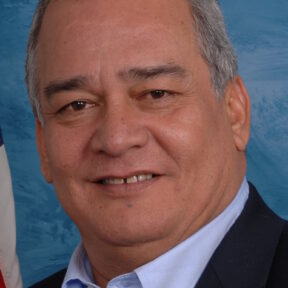
Gregorio Kilili Camacho Sablan
Photo from Wikimedia Commons / Author of Photo: Office of U.S. Rep. Gregorio "Killi" Camacho SablanOverview
* Was a special assistant to Democratic U.S. Senator Daniel Inouye of Hawaii in the 1980s
* Was elected as a non-voting member of the U.S. House of Representatives in 2008
* Member of the Congressional Hispanic Caucus
Gregorio Kilili Camacho Sablan was born on January 19, 1955, in Saipan, the largest of the Northern Mariana Islands (NMI) in the western Pacific Ocean, which together constitute a commonwealth of the United States. He was one of seven children from a family with Chamorro and Hispanic roots.
After graduating from Marianas High School on Saipan, Sablan attended the University of Guam and then UC Berkeley, but he never received a college degree. He subsequently served as a special assistant to Carlos S. Camacho, the first governor of NMI, in the late 1970s and early ’80s. And in 1981 he was elected to the NMI Commonwealth Legislature, where he held a seat until 1986. Thereafter, Sablan was employed variously as a special assistant to Democratic U.S. Senator Daniel Inouye of Hawaii, Commonwealth Governor Froilan Tenorio, and Commonwealth Governor Pedro Tenorio. Next, he was appointed as executive director of the Commonwealth Election Commission.
In 2008 Sablan was elected as an independent, non-voting member of the U.S. House of Representatives, serving as a delegate from NMI. Though officially “independent,” he caucuses with the Democratic Party and is a member of numerous House caucuses, most notably the Congressional Hispanic Caucus and the LGBT Equality Caucus.
Sablan strongly supports “comprehensive immigration reform” that would provide a “pathway-to-citizenship” for millions of illegal aliens residing in the United States. In June 2014 he said that if the GOP were to fail to compromise with Democrats and help to pass such legislation, “Republicans can kiss the White House goodbye for the next 16 years.” “It’s not a question of if it’s going to happen [immigration reform],” said Sablan. “It’s a question of when…. Comprehensive immigration reform changes the immigration laws of the U.S., and that change will be progressive and liberal.” “Don’t forget,” Sablan added, “every day 2,000 Latinos are turning 18 [the legal voting age] — just Latinos alone — and with comprehensive immigration reform it involves Asians, Europeans, and other people.”
In Sablan’s calculus, one of America’s “most urgent national priorities” is the passage of DREAM Act legislation that would legalize and eventually naturalize a large number of so-called “Dreamers” — i.e., illegal-alien teens and young adults who first came to the United States as minors.
Sablan is a devoted supporter of former President Barack Obama’s Deferred Action for Childhood Arrivals (DACA) initiative, which began with a 2012 executive action temporarily protecting hundreds of thousands of young illegals from deportation. In July 2017, Sablan stated that DACA “gives these Dreamers the ability to continue to live and work in America.” In 2017 as well, Sablan co-sponsored the “American Hope Act,” which called for the federal government to give conditional permanent-resident status and, ultimately, citizenship to law-abiding DACA recipients. “That is a fair bargain for young people who never chose to break the law and have lots to give our nation,” said Sablan.
During his tenure as a delegate in the U.S. House of Representatives, Sablan has helped to promote and pass legislation to increase government funding for NMI schools and students, for the NMI-based Commonwealth Healthcare Center, and for water and sewer projects in his home district. Sablan was also instrumental is securing expanded federal food and energy assistance for low-income families in his district.
Further Reading: Kilili Sablan’s Biography (Votesmart.org, Sablan.house.gov, Ballotpedia.org); “Kilili: Comprehensive Immigration Reform Will Pass” (Saipan Tribune, 6-13-2014); “Protecting Dreamers” (Sablan.house.gov, 6-30-2017, re: DACA & the American Hope Act).